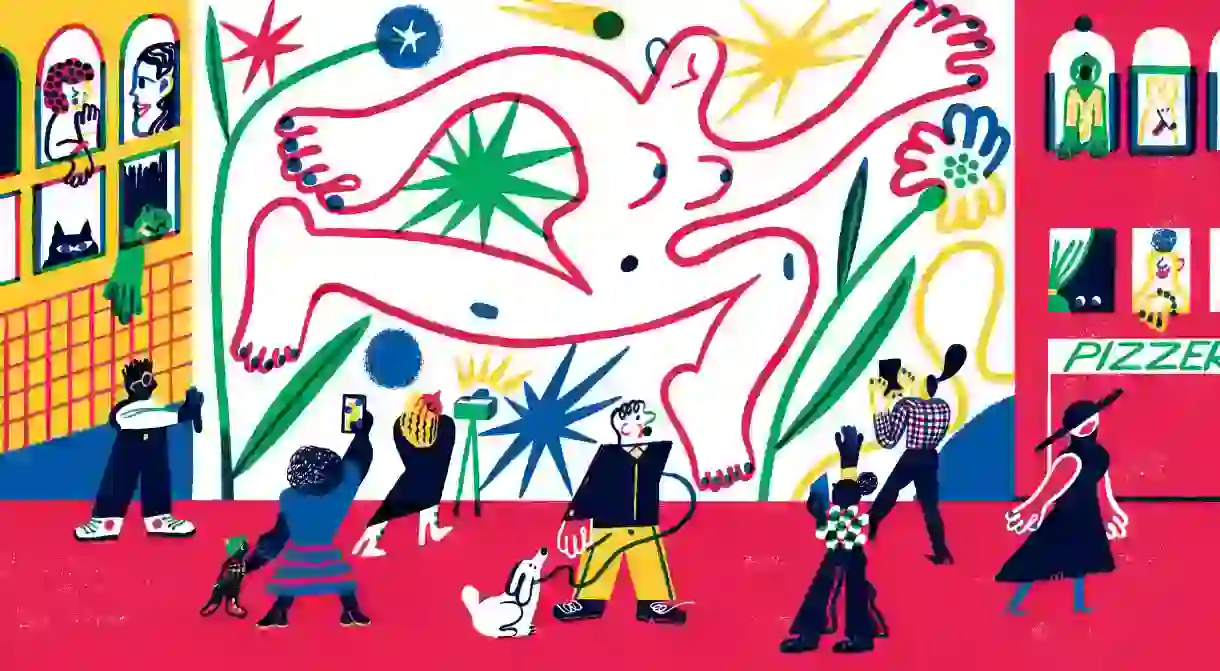Italy’s Greatest Street-Art Spots in 7 Marvellous Murals

Think of Italian art, and the Renaissance usually springs to mind. But the street-art scene, from Rimini to Rome and Sardinia and Sicily, is thriving – much of it rooted in the politics of anti-fascism and even the mafia. Here’s where to find some of the country’s most striking works.
Italy is famously the land of art. Renaissance, of course – every town has that coming out of its ears – but beyond the tourist trail, there’s a buzzing contemporary scene. Street art cemented its status in February 2021 when the Uffizi in Florence added a work by the London artist Endless to its collection. The next step for Endless was to create a mural for Cortina d’Ampezzo, an Italian ski resort, thereby joining Italy’s long, and often deeply political, street-art tradition. Here are some of the Bel Paese’s most important modern murals.
Sardinia: Orgosolo
The inhabitants of this mountain town were called bandits not so long ago; the Romans called them barbarians – hence the name of the region, Barbagia. How things have changed. In 1975, to celebrate 30 years since Italy’s liberation from fascism, the residents started painting murals, turning Orgosolo from a no-go area, said to be behind feuds and kidnappings, to an outdoor gallery. Today, the works double as a collective memory for the community, with artworks of Saddam Hussein’s downfall and a reproduction of Picasso’s Guernica alongside Sardinian anti-fascist marches, anti-government shepherd protestors, and even police brutality from 1899.


Milan: Ortica
Italy’s tumultuous 20th century is told through the murals of the Or.Me – Ortica Memoria project, which has transformed this once industrial suburb near Linate Airport into an open-air museum. It’s an intimate history on display – one of anti-fascists and partisans, workers’ rights campaigners and cooperatives, plus the Milanese women who stamped their mark on the 20th century, from suffragette Alessandrina Ravizza to poet Alda Merini, who wrote about her time in a mental institution. More than 100 locals joined with the professionals to create 20 murals, inscribing their cultural history on office blocks and railway bridges.
Pisa: Chiesa di Sant’Antonio
If you think Italy was late to jump on the street-art bandwagon, in 1989, a church hired Keith Haring to transform its vicarage wall with Tuttomondo – a riot of pinks, blues and yellows. In what turned out to be one of the groundbreaking graffiti artist’s last works (he died the following year), completed in just four days, 30 bodies interlace across the 180sqm (1,938sqft) wall. While they’re typical Haring figures, fizzing with energy, he also incorporated symbolism about good overcoming evil, humanity in thrall to mass media and, in a nod to the location, the four-pointed Pisan cross, the symbol of the city.
Rimini: Borgo San Giuliano
Italy’s beloved film director Federico Fellini came from Rimini, and the ritzy beach resort pays homage to its most famous son in Borgo San Giuliano, its village-like fishing quarter. Iconic images from his films – think Marcello Mastroianni and Anita Ekberg’s classic kiss in La Dolce Vita (1960) and Donald Sutherland in Casanova (1976) – are painted on pastel-coloured façades, along with murals of Rimini landmarks, plus Fellini and Mastroianni chatting on set. It’s all so out of sync with the quiet village atmosphere that walking around feels almost surreal – the perfect tribute to his dreamlike films.


Palermo: La Cala
You know about the Sicilian mafia, of course. And you may know about Giovanni Falcone and Paolo Borsellino, the anti-mafia prosecutors who were assassinated in 1992. So you might want to pay your respects at La Cala marina, where, in 2017, the city paid homage to them both with a giant mural on a four-storey building, pointing towards the Gulf of Palermo. Sicilian artists Rosk & Loste used a crane to navigate their giant canvas, using spray paints to recreate a famous photo of the two friends laughing, which has become a symbol of the fight against Cosa Nostra. “This mural should remind everyone that this is the city of Falcone and Borsellino, not of the mafia,” said politician Rosy Bindi when it was unveiled.
Turin: MAU
Don’t be confused by the name. The Museo d’Arte Urbana, or Street Art Museum, is actually an entire district called Borgo Campidoglio, 3km (1.9mi) from the centre, whose shop- and housefronts have been brightened up by 180 works of art. Take a volunteer-led tour to learn about the project, which regenerated the neighbourhood after the nearby factories closed, or go with the effervescent Claudia Kiki of Street Art Tourino. Commissioned by homeowners and neighbourhood associations, there are images of sunflowers covering doors, benches channelling everyone from Pollock to Picasso, and vast murals including a gigantic sun across an entire building, flashing you a welcome on arrival.
Rome: Jonio Metro Station
The Eternal City proves culture really does last forever, with street-art projects popping up alongside famous landmarks such as the Spanish Steps. Take the Metro Line B to the northern Jonio terminus to see Italy’s first same-sex street art commissioned by a public body. The work of two women kissing outside the station is by Rome-based artist Krayon, a graphic designer-turned-street artist who works in giant pixels. The 15m (49ft) work was unveiled in March 2021 in aid of Italy’s Gay Helpline, a support line against trans- and homophobia. The location is significant – not far away is a plaque honouring Paolo Seganti, who was murdered in a homophobic attack in 2005.


Connect with the culture and beauty of Italy and begin planning your trip by visiting italia.it













